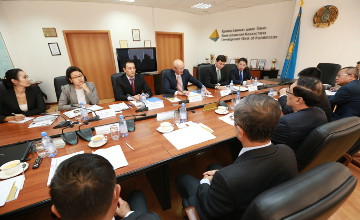
 Kazakhstan Development Bank CEO Bolat Zhamishev and China Development Bank president Zheng Zhijie discussed on Wednesday promising directions of further cooperation, the bank’s press service said.
Kazakhstan Development Bank CEO Bolat Zhamishev and China Development Bank president Zheng Zhijie discussed on Wednesday promising directions of further cooperation, the bank’s press service said.
The parties agreed on boosting cooperation to the befit of both nations. Zhamishev briefed on opportunities for project finance in Kazakhstan’s non-energy sectors, infrastructure. As of today, the bank’s project pipeline exceeds KZT 1 trillion.
Besides, this May Kazakhstan Development Bank and China Development Bank entered into a general agreement on opening a USD 500 mln credit line. The parties expressed interest in sooner realization of the given agreement.
Source: Kazinform



